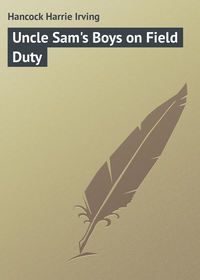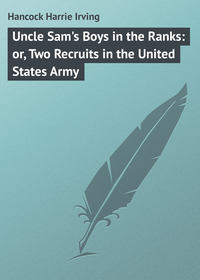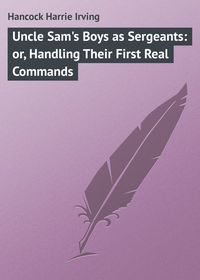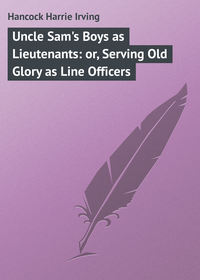 полная версия
полная версияThe Motor Boat Club at the Golden Gate: or, A Thrilling Capture in the Great Fog
Halstead, whose ears were perhaps the keenest on board, listened and occasionally signaled for the launch to be veered a little either to port or starboard.
Surely, they were creeping up on something that ran by machinery, though through the curtain of white no eye could make out the form of a vessel.
Somewhere, away to starboard, a great, deep note boomed out.
"That's some big vessel, like a liner," Tom whispered to Jephson. Then, from away off to port sounded the tolling bell of a sailing vessel. Both appeared to be headed toward the "Panther" launch.
"They seem to be about half a mile apart," Halstead whispered. "The 'Victor,' I think, will pass between the two craft. While that deep whistle and solemn bell are going the people on the steam yacht are not so likely to hear us. Pass the word to Mr. Prentiss to increase speed a little, if he can do so without making more noise at the exhaust."
A little faster spurted the power tender, and a little worse became the tossing in that rolling sea. All the members of the party were in drenched clothing by this time. The water came aboard faster under this burst of speed; the two seamen began to bail it out.
"If I ever get out of this boat alive, large yachts will be small enough for me in the future," Mr. Jephson told himself, nervously.
Tom Halstead was paying no heed to the incoming water. That was Joe's affair, since Joe Dawson was handling the craft.
"Pass the word to Jed to watch for signals from me," whispered Tom Halstead, tensely, a few minutes later.
"Then you think – " began the district attorney's assistant eagerly.
"Pass the word for me, please," Tom broke in.
In the gray fog ahead some craft was moving by steam power. Those in the launch could now hear the regular thump-thump, soft though it was, of machinery ahead.
Yet, to most of the silent watchers it came as something of a shock when, out of the mist ahead, there suddenly loomed, indistinctly, the stern of a hull.
Away to starboard sounded the deep whistle of the big steamship, while over to port the bell of that sailing vessel tolled. The noise enabled Halstead to creep in more closely with less dread of being discovered too soon.
A moment's breathlessness, then "Victor – San Francisco" stood out boldly before the eyes of the people in the launch as that boat shot in by the yacht's stern.
They were taking grave chances, now, of being swamped at the very door of success. None knew this better than Tom Halstead and Joe Dawson as they jointly manœuvred to run the tender up stealthily, while Jed Prentiss, trembling inwardly, kept his hand on the lever, ready to obey the slightest signal for speed.
Then, swiftly, Tom Halstead, a rifle strapped over his back, rose in the bow. In one hand he held a line to the other end of which was attached a grappling hook.
With a practiced eye and hand he measured the distance, poising the coil for a throw. Just as the tender stole in closer he made the throw.
All hands watched breathlessly for a second or two. Then, as straight and true as a well-aimed bullet, the grappling hook fell and caught at the "Victor's" stern rail.
Not an instant did the young motor boat skipper lose. There was no time to inquire whether someone else wanted to go first. Tom Halstead seized the tautening line with both hands, and began to climb as only a sailor can go up a rope.
His head quickly appeared above the steam yacht's stern rail. Tom Halstead slipped onto the deck just in time to see two men walking slowly aft. One of them was in uniform – perhaps he was the captain of the steam yacht. But the other, in civilian dress, the young motor yacht captain knew instantly from the description of him which he had heard.
"Frank Rollings, the absconding cashier!" flashed through Tom's mind.
CHAPTER XXIII
ROLLINGS'S LAST RUSE
Both approaching men were regarding the deck, talking in earnest tones as they came astern.
"If we should pass out of this fog," Rollings was saying, "and if the 'Panther' should prove to be close to us – "
Just at this point the speaker stopped. He panted, then staggered back, clutching at his uniformed companion.
In almost the same instant both caught sight of lone Tom Halstead.
Though not quite alone, either, for Tom had succeeded in unlimbering his rifle, and both strangers now found themselves staring down into the muzzle.
"Don't stir, please!" mocked Tom Halstead, coolly.
"How in the world did he get on board?" faltered Rollings, hoarsely, his face ashen with terror.
The uniformed man with him saw the grappling hook resting over the stern rail, and did not need to ask.
At this instant Tom Halstead felt himself being pushed from behind, and took a step forward. Then Ted Dyer bounded onto deck beside him, bringing another rifle into play.
"They're boarding us!" gasped Rollings, in the voice of a man who felt himself dying from fright.
The uniformed man with him did not move; neither did he show any signs of fear, though he was facing the business ends of two rifles.
Joe Dawson was on deck, now. Joe turned long enough to toss down a light line. It came up again, carrying the hooks of a boarding-ladder. Joe dropped this into place, then, with a quiet grin, turned to inspect the scene on deck.
Suddenly the man in uniform turned and ran, defying possible shots.
"Turn out the whole crew!" he bawled. "A posse is coming on board. Stand by to fight!"
"Shall I drop the fellow?" quivered Ted.
"No," came Halstead's quick answer. Then, as Frank Rollings summoned the strength to wheel about as if to bolt, Halstead shouted, warningly:
"Rollings, if you try to move, you won't get three steps away!"
At this instant one of the United States deputy marshals came up over the rail.
"Officer," called Tom, "there's the man you've cruised so far to arrest."
Though he had a rifle strapped over his back, the marshal drew his revolver as he ran forward.
"Frank Rollings, you're a United States prisoner. Put up your hands!"
With a moan that was half a scream, Rollings, instead, sank to the deck in a huddled heap.
"A man with no more nerve than you have should not try to loot a bank," growled the officer, as he snapped handcuffs onto the wrists of the seemingly palsied wretch.
The other deputy was on board, by now, and other members of the boarding party were coming up fast. Mr. Jephson was among the foremost of them.
"Come forward to the bridge," he called, now taking charge. "We'll take command of this whole craft. Deputy, make it your whole business to prevent your prisoner from getting away. Hold on to him, but come forward with us."
The same uniformed, bearded man appeared suddenly around the pilot house as the party swept forward along the port side of the yacht. Rollings, his knees doubling under him, had to be dragged.
The uniformed man suddenly raised a rifle, shouting:
"Stand by, men! We'll put a stop to this nonsense!"
"Drop that gun, or we'll open fire on you!" shouted Mr. Jephson, sternly.
The boarding party moved swiftly forward. Behind the captain stood a mate and four or five seamen, all looking irresolute. Of a sudden the mate wheeled, throwing a rifle over the rail at starboard. The seamen with him instantly followed his example.
Even the bearded captain had lowered the muzzle of his rifle. It is easier to be brave on the side of the law than against it.
"Put that captain in irons," Mr. Jephson ordered the marshal who had no prisoner to cumber him.
Sullenly, the captain of the "Victor" submitted to being handcuffed.
"All of the rest of the officers and crew muster up in the bow," called Mr. Jephson. "Captain Halstead, I call upon you to take command of this yacht for the present. The quartermaster of this craft may remain in the wheel house if he'll take orders straight."
"Aye, aye, sir," the quartermaster called, briefly, through one of the lowered windows of the pilot house.
Tom Halstead, still carrying his rifle and holding it ready, ran up to the bridge.
Stepping over to the signaling apparatus, Halstead rang for speed enough to furnish bare headway.
"Quartermaster," the new commander of the "Victor" called down through the wheel house speaking-tube, "you'll keep to the same course you've been following, and sound the fog whistle every thirty seconds."
"Captain," called Mr. Baldwin, a few moments later, "can you put one of your party up there on the bridge? We have yet other duties to perform here."
"Take the bridge, Mr. Prentiss," called Tom, for he understood instantly what other work was likely to be on hand, and he knew that Joe Dawson would want a hand in it.
Aft of the captain's quarters there was a main deck house. Into this cabin Rollings and the captain of the steam yacht were taken. Mr. Jephson was now talking to the two prisoners as solemnly as though holding actual court.
"Do you think the 'Panther' will overtake us here, out on the high seas, Captain?" questioned Mr. Baldwin, just as they entered this cabin. "That is, will he recognize the 'Victor's' fog-whistle?"
"He'll make a good guess at it, I think," laughed Halstead. "I've just directed Mr. Prentiss, in ten minutes more, to begin sounding whole bunches of blasts in quick succession. Ab will be clever enough to guess that it is our crowd celebrating a capture."
"Now, then, Rollings," declared Mr. Jephson, sternly, "it is time for you to tell us where the money stolen from the Sheepmen's Bank is hidden aboard this craft?"
"You won't find five hundred dollars on board," replied the cashier, with a ghastly smile.
"My man, it may save you some years on the sentence that is coming to you if you tell us promptly where to find the stolen money," warned the United States assistant district attorney, sternly.
"I've said all I'm going to say," returned Rollings, sullenly.
"Captain Blake," asked Jephson, turning toward the bearded one, "you also have much to answer for in the courts. Do you desire to win any leniency by telling us, now, what you can?"
"All I've anything to do with here," retorted Captain Blake, "is the running of this yacht. That work you've taken from me. So I've nothing to do, and nothing to say."
Mr. Jephson, however, continued to question first one prisoner, then the other, though in vain, until Mr. Baldwin broke in:
"Jephson, you can't make these fellows talk. They're afraid they'd only run their necks further into the noose of the law. Besides, this rascal, Rollings, hopes that, if you can't find the money, he'll win complete pardon in the matter by restoring most of it later on. It'll save a good deal of time, I imagine, if you place both these fellows under close guard by one of your deputies, then lead us in a search through this craft."
By this time Jed Prentiss, following orders, had begun to turn loose on the fog-horn, sounding it so rapidly that Ab Perkins, somewhere behind in the mist with the "Panther," must be able to guess what had happened.
One of the deputies now guarded Rollings and Captain Blake, while the other had gone below to the engine room. There the engineer's crew had agreed to serve faithfully under the new command, but the deputy was there to see to it that they didn't change their minds. Quartermaster Bickson and one of his seamen had driven the crew of the "Victor" to the forecastle, and mounted guard over them.
The searchers, comprising Mr. Jephson, Mr. Baldwin and the latter's captain, Halstead, were joined by Mr. Ross, Joe Dawson and Ted Dyer.
"There are enough of us here," laughed Mr. Baldwin, "to turn this craft inside out in another half hour."
First of all, Frank Rollings's own quarters were searched, as a matter of course. It had been learned, since coming aboard, that the absconding cashier was now the owner of the "Victor," having bought her secretly three days before his flight.
There was no safe in the owner's cabin. The desk stood wide-open, with hardly a scrap of paper in it. The mattress was yanked from the bed, ripped and thoroughly searched, but not a trace of the stolen money was found. The pillows were served in the same fashion, with no better results. Other nooks and corners of the cabin were explored, without success. Nor were any better results achieved in the captain's cabin.
Cabin, dining room and state-rooms below were explored. By this time the searchers had broken up into smaller parties. The more they searched the more dispirited did the hunters become.
"We're not going to find the missing money with ease," announced Mr. Jephson, when he had rounded up all his searching force on deck.
"We've looked in about every possible place except the forecastle, the water butts and the coal bunkers," declared Jason Ross, disgustedly.
"The money isn't likely to be in any of those places," declared Mr. Jephson, shaking his head. "Hullo, what's that racket?"
Off in the fog a horn was sounding frantically.
Tom Halstead laughed.
"You ought to know that tune, Mr. Jephson. You've heard it days enough. That's the 'Panther' coming up with us, with Ab Perkins in command. He understood our signal, as I thought he would. He'll be hailing us within two minutes."
"But that won't be finding the money," broke in Joseph Baldwin, impatiently.
"Nor do I believe we're going to find it – not immediately, anyway," answered Mr. Jephson. "This boat doesn't seem to be full of hiding places, and I believe we have done all the searching we can do out here at sea. We shall have to run the 'Victor' in at anchorage at San Francisco, then put aboard a force of officers under experienced detectives, and leave the search to them."
"Confound it," growled Jason Ross, "I know, as well as I know I'm standing here, that there are three million dollars in actual cash somewhere within a hundred feet of us. It makes me almost frantic to think that we can't put our hands right on it."
"Ahoy, there!" roared a voice off in the fog.
Though the other craft was invisible, and though the voice came through a megaphone, the hearers knew it was Ab Perkins's voice. Jed snatched up a megaphone to shout back:
"Ahoy, 'Panther'!"
"Ahoy! Then you've found the 'Victor'?"
"Aye, and captured her."
"Did you find Rollings!"
"He's a prisoner, under close guard."
"And the money?"
"That's what we all want to know," Jed admitted, sadly.
"You can't find it?"
"Not even a dollar bill!"
There was a pause, during which those on board the steam yacht knew that their friends on the motor yacht were discussing this chilling news.
"What are Captain Halstead's orders?" shouted Ab, finally.
Jed bent over the bridge rail to talk with Captain Tom, then answered:
"Keep about abreast of us, and a quarter of a mile off. Proceed with us, straight for the Golden Gate. Keep your fog-horn sounding at intervals of one minute, or at such other intervals as you may hear us sounding. Three sharp blasts of the whistle will mean for you to stand by to find out what we're doing in the fog."
"Aye, aye," answered Ab Perkins. "Is that all?"
"That's all, Mr. Perkins."
The "Victor" now proceeded on her way to the home port at about eight miles an hour. Though no one on board could see the "Panther," the sound of the latter's fog-horn was always with them.
"The prisoner, Rollings, wants to see you, Mr. Jephson," called the deputy marshal from the deck-house cabin.
Jephson went back.
"Well, Rollings, have you come to your senses? Are you going to tell us where the missing money is?" demanded the assistant district attorney.
"I know nothing about any missing money," replied the bank cashier, doggedly. "See here, man, what I want to ask is: Do you intend to torture me needlessly?"
"No; what do you want?"
"Let me go to my own cabin, and let me have these handcuffs off," pleaded the prisoner. "I need rest; I'm nearly a wreck."
"I can let you go to your cabin, and even remove the handcuffs," agreed Mr. Jephson. "But I'll have to place a guard in there with you.
"All right, then," sighed the prisoner.
He was taken to his own cabin, the handcuffs removed, and the cashier threw himself upon his bed, while the deputy marshal took a seat where he could watch his man.
Captain Blake begged a similar privilege, which was refused. He was made to go out on deck where he could be watched by all hands.
For half an hour Rollings lay on the bed, his eyes closed, as though asleep. Occasionally he twitched, or made some slight movement. That was all. The deputy seated opposite began to find the situation a dull one. At last the prisoner half sat up, to take off his shoes.
"My feet are burning," he complained, as he dropped the shoes at the foot of the bed, then sank back on the pillow.
"You're nervous; that's why your feet trouble you," observed the deputy, with a knowing smile.
Then Rollings began to breathe heavily; bye and bye two or three snores escaped him. The deputy, finding it duller and duller, unintentionally allowed his eyes to close. Instantly the cashier's own eyes opened a trifle. At last, smiling cunningly, the cashier moved slightly, securing one of his shoes. He poised it, aimed and threw. The heel of the shoe struck the deputy on the head, causing him to drop forward out of the chair and lie apparently senseless on the floor.
Suppressing a cry of exultation, Frank Rollings leaped from the bed. There was now the light of mania in his eyes. This thief, disgraced, about to be despoiled, and presently to be sent to prison for a long term, preferred to die.
This he might have accomplished with the deputy's revolver, but that would not enable him to carry out all of his purpose. On one wall of the cabin stood a rack containing a water-bottle and two glasses.
Over to this rack stole the captured thief. He swung the rack to one side, then pressed a certain nail in the wood-work there. Instantly a door in the wall swung open.
Rollings's eyes eagerly peered into the recess thus laid bare. Then, with a nearly inarticulate cry of joy, he drew out a small though heavy-looking iron box.
"Neither me nor the money shall they have!" uttered the wretch, in insane joy.
With a last look at the still unconscious deputy, Frank Rollings threw his cabin door open.
As he sprang to the deck three or four watchers saw him.
"Look out! There's the prisoner trying to escape!" shouted Joseph Baldwin.
There was not time for anyone to reach Rollings ere that crafty, unbalanced wretch, clutching desperately at the iron box, bounded to the rail, stood there tottering for an instant, and then leaped far out into the water.
It was Tom Halstead who first saw the iron box and comprehended the meaning of the scene.
"There he goes!" yelled Halstead. "And the box with the three millions in it will sink like a stone!"
CHAPTER XXIV
CONCLUSION
Never slow to act, Captain Tom darted aft, intent on leaping overboard also.
Ted Dyer, however, chanced to be standing close to the stern. Ted saw Rollings when the latter first leaped to the rail.
As quickly as it flashed upon Dyer what was happening, the San Francisco boy scrambled to the rail. Almost at the instant that Rollings jumped Ted's own feet left the rail. The two struck the water within thirty feet of each other.
Nothing but the slow speed of the steam yacht, perhaps, saved both from being dragged under by the force of suction. In a moment or two the pair were left astern.
Feeling the shock of the cold water, Rollings's first instinctive act was to try to keep himself afloat. Curiously, he would not, at first, let go of the iron box, which, with its contents, weighed many pounds.
Now, over the top of a rolling wave Ted Dyer's head appeared. All this had taken place in a few seconds.
"You want to catch me – you want the money!" sputtered Rollings, expelling a spray of water from his mouth. "You shall do neither!"
Clutching tightly at the box as an aid to his own drowning, Frank Rollings let himself go beneath the surface.
Promptly Ted went down after him, swimming straight and lustily.
Another figure sprang forward and downward, shark-like, through the water. This was Tom Halstead, who, with his stoutest strokes, had just reached the scene.
Between them Tom and Ted succeeded in seizing the box. By a common impulse, for they could not talk, they forced it from Rollings, rising to the surface.
"Blub-bub-bub – whew!"
Rollings, rising to the surface, made that noise as he fought for breath. The cashier, an excellent swimmer, saw the two boys, a dozen feet away, swimming and holding up the box.
"Neither me nor the money shall you have!" he roared, striking out at a strong overhand swimming gait. He was almost upon them like a flash.
But there was another there, too. Joe Dawson had also leaped over from the rail of the motor yacht. Joe got along just in time to swim between Rollings and the two boys who were doing their best to keep up and hold the iron box, too.
"Back for yours! Go away back and float!" cried Joe, pushing one of his fighting hands against the cashier's face.
"I'll take you down, then, or the box!" screamed Rollings.
"Oh, all right, then. Take me," mocked Joe. "I'm used to it."
Furiously the pair fought in that rolling sea. Joe devoted every energy, first of all, to keeping the cashier from winding his arms around him.
Presently Rollings gave up that effort, trying to dodge around Joe and get at the other pair, who, swimming slowly, were at the same time managing to keep that precious iron box afloat. This latter task, easy at first, soon became difficult. As the minutes passed the box became more and more of a burden, until it threatened to drag both swimmers under. Yet they hung to it manfully.
Up on the bridge of the "Victor" Jed Prentiss had his own hard task to perform.
Almost at the outset the swimmers had vanished in the fog astern. Jed Prentiss instantly gave orders for the steam yacht to stop and reverse the screw. At the same time he ordered the "Victor" to go around hard-a-port. Even this circle had to be one of large diameter.
"No hails down there on the deck!" rang Jed's voice, sternly. "No confusion of calls. Let me do all the hailing."
Megaphone in hand, young Prentiss stood at the port bridge rail.
"Ahoy!" he roared, through the megaphone.
Again and again he repeated the call. At last he thought he heard an answer out of the deeps.
"Louder!" he roared. "Give us your position."
Suddenly, some sixty feet off the rail, Jed just made out the heads of Joe Dawson and Frank Boilings.
The cashier was floating, now, making no resistance, for Joe had struck him a blow across the head with his clenched fist. Rollings, stunned, floated unresistingly, supported by Dawson.
"We'll have a boat to you in a jiffy!" shouted Jed, while Bickson threw a life preserver with almost perfect aim.
Now, the "Victor," whose speed had been slowing down, was stopped.
Joe and his charge had drifted just out of sight, but a boat was quickly lowered, under command of Bickson, and reached the pair, after hailing.
"Where's the captain?" demanded the quartermaster, as Joe and Rollings were hauled in.
"Hail 'em. They're close at hand," Joe replied.
The first hail brought an answer. In a few moments more the iron box was carefully brought over the side into the small boat. Finally Tom and Ted nimbly joined the others.
"Get back to the yacht as quickly as you can. Rollings may come to, and, fighting in a small boat like this, he could make it unsafe – for the money," Captain Tom Halstead added, with a wan grin.
Little time passed before strong hands bore the iron box up over the side of the "Victor." Then Frank Rollings, just beginning hazily to come to, was carried up. This time he was handcuffed, to remain so until San Francisco should be reached.
It was an anxious conference that gathered in the main cabin as Assistant District Attorney Jephson proceeded to force the iron box that had come within a hair's breadth of going to the bottom of the ocean. The three boys who had gone overboard after it stood by in their dripping garments.
As the lid of the sheet-iron box went up, a subdued cheer arose. This increased in volume to a din as Mr. Jephson swiftly tore the paper wrappings from one of the packages that he had lifted out. The first tightly-packed bale of crisp, new thousand-dollar bills was in view.









